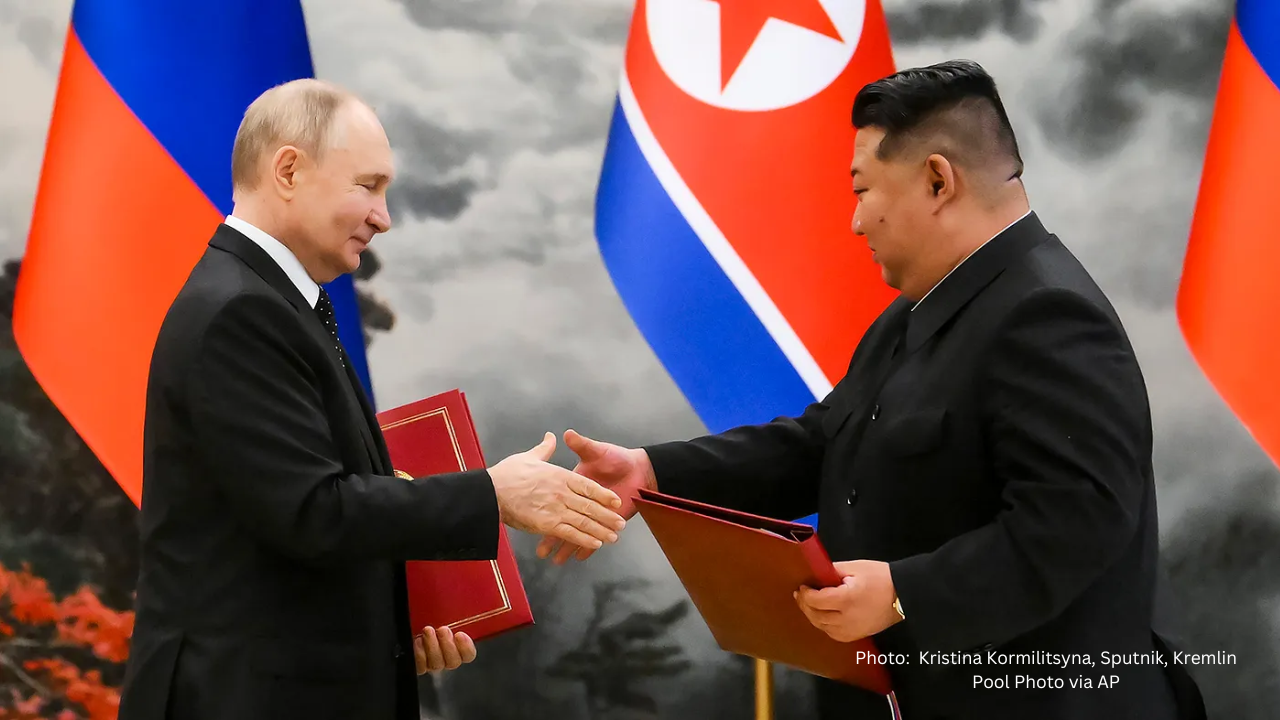Forging Alliances: North Korea and Russia's Bold Move
Nuzhat Tabassum | 25 June 2024
Russia which used to deter North Korea in its nuclear program with the international community is now giving support to North Korea openly. A significant breakthrough has happened between North Korea and Russia as the two countries made a new deal this June which is considered the strongestsince the Cold War. Two leaders of the country have signed a comprehensive strategic partnership agreement during the Russian president’s high-profilevisit to North Koreaafter 25 years. The deal will replace several previous agreements, including the Treaty of Friendship and Mutual Assistance of 1961, the Treaty on Friendship and Good Neighborliness in Cooperation of 2000, and the Moscow and Pyongyang declarations of 2000 and 2001.
The agreement pledges mutual aid if any one of the countries faces aggression, the other country will assist without delay and with whatever they have at their disposal. The agreement not only commitsto defense assistance but also to matters such as cooperation in military, foreign policy, and trade. The treaty also aims to establish a just and multipolar new world order as both countries are facing tensions with the US and its Western allies. Kim Jong Un has said the agreement is the ‘strongest-ever treaty’ while Putin has said that the agreement is a ‘breakthrough document’.
The world is concerned over this agreement in which Pyongyang provides arms to Russia to continue its war in Ukraine, in return, it will receive economic assistance and technology from Russia as well as bypassing global sanctions and increasing its leverage in the regional power dynamics. But in this process, the agreement willincrease tensions in the Korean Peninsula. The US and South Korea have accused North Korea of sending weapons to Russia for the war in Ukraine and violating international laws. Some analysts have suggested that the deal is a sign of bolstering ties between nations hostile to the US and the rules-based global order, which has served as the foundation for international affairs since the end of the Second World War. They also suggest that historically relations between the two countries have been based on interest.
The strengthening relationship between Russia and North Korea has been a grave threat to the US and its allies since the Korean War. Based on the authoritarian regimes' growing support for one another, the agreement increases the possibility of a new dictatorship axis. The consequences for world peace and security are severe, resembling the build-up to the world war seen in 1938. Given the millions of rounds of ammunition and several ballistic missiles that Russia uses in combat, its effect on European security is evident. The deal also poses a threat to the US as well. The deal has made it harder for Western countries to halt North Korea’s nuclear ambitions. If North Korea demands high-end nuclear and missile technology from Russia, Putin will have no choice but to comply with the demand. It would be advantageous for North Korea to have a nuclear weapons force equipped with nuclear submarines and advanced intercontinental ballistic missiles that could get past American missile defense systems.
South Korea has announced that it will strengthen security cooperation with the US and Japan and has banned 243 new items from export and reviewed its position on giving arms to Ukraine. The deal will bring the US, Japan, and South Korean military alliance closer making the Indo-Pacific region even more of a hotbed for joint militaryexercises, demonstrations, and an increased US presence.Some experts are saying that China would be somewhat anxious about the growing relationship between Russia and North Korea but this could lead to, though unlikely, Sino-US efforts to deter Russia and North Korea from moving forward. Also, China and South Korea held their first security dialogue in nine years in response to the news of Putin's visit to Pyongyang.With rising tension in the Korean Peninsula in recent years, the recent development has already taken a toll. North Korea is instigating low-intensity provocations such as trash balloons, GPS jamming attacks, and activities near the Military Demarcation Line (MDL). Experts also point out that, North Korea may conduct a military provocation to open a second front in Northeast Asia and divert the military power and attention of the U.S. and the West if the war in Ukraine goes badly for Russia.
The 2024 deal between North Korea and Russia has the potential to profoundly alter global political conditions by strengthening the military alliance between the two countries, undermining Western dominance, and possibly escalating hostilities in the Northeast Asian region.
Nuzhat Tabassum is a Program Assistant Coordinator at CGS
The views expressed in these write-up are solely those of the author and do not necessarily reflect the policies of CGS.
